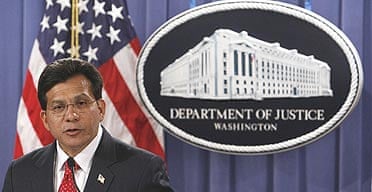With only 16 months left in the White House, George Bush can nominate a new and uncontroversial attorney general who would win swift Senate confirmation.
The path of least resistance would be to select a justice department insider who could slot into the top job, vacated by Alberto Gonzales, with a minimum of fuss and disruption.
However, that would not be in the president's style - he has never shied away from unpopular positions, with the military "surge" in Iraq being a case in point.
Meanwhile, the Democrats, who now control Congress, have already laid down markers for Mr Gonzales's successor.
The Democratic House speaker, Nancy Pelosi, has said Mr Bush's nominee for attorney general must pledge "to cooperate with ongoing congressional oversight into the conduct of the White House in the politicisation of federal law enforcement."
An ardent critic of Mr Gonzales, Senator Charles Schumer, from New York, said it was time for Mr Bush to choose a replacement who was "a professional, not a partisan, not a pal".
The Democrats also pledged to continue their investigations into his tenure, including his role in the firing of eight US attorneys last year, which Democrats claim was done on political grounds and on orders from the White House.
Early speculation on possible replacements has focused on the Homeland Security secretary, Michael Chertoff, a former assistant attorney general and federal judge who has the legal expertise found lacking in Mr Gonzales.
However, Mr Chertoff blotted his copybook - and faced calls for his own resignation - after his department's slow response to Hurricane Katrina in 2005.
Others mentioned include Theodore Olson, a Washington lawyer and former solicitor general whose wife, Barbara, was killed on the September 11 flight that crashed into the Pentagon and Larry Thompson, the general counsel of PepsiCo and formerly the No 2 at the justice department.
Both men served under the former attorney general John Ashcroft in Mr Bush's first term.
One of the more intriguing names to have emerged is that of the Democratic senator Joe Lieberman, from Connecticut, who is generally loathed by Democratic activists for vocally supporting Mr Bush on Iraq.
His nomination would be politically mischievous on several counts. Not only would such a move put Democrats in an uncomfortable position should they oppose one of their own for a top administration job, but it would also allow Connecticut's Republican governor to appoint his replacement, taking away control of the Senate from the Democrats by splitting it down the middle.
Whoever is appointed attorney general can expect a rough ride, particularly over the administration's plans to permanently overhaul the domestic wiretapping law, which the Democrats strongly oppose. The law is going to be a major source of contention when Congress returns to work next month.
In any case, the job of attorney general traditionally attracts plenty of political flak. Mr Gonzales was just the latest controversial appointment in a long line that goes back to Robert Kennedy, who was appointed by his brother Jack, and Edwin Meese, chosen by Ronald Reagan.
